Our philosophy
We believe that the realisation of large, complex projects requires a combination of good systems engineering practice, strategic planning, project management and systems thinking. In our courses we instill this multi-level, long term view of systems development so that the organisation undertaking such developments can be pro-active in dealing with the dynamics of the modern business environment.
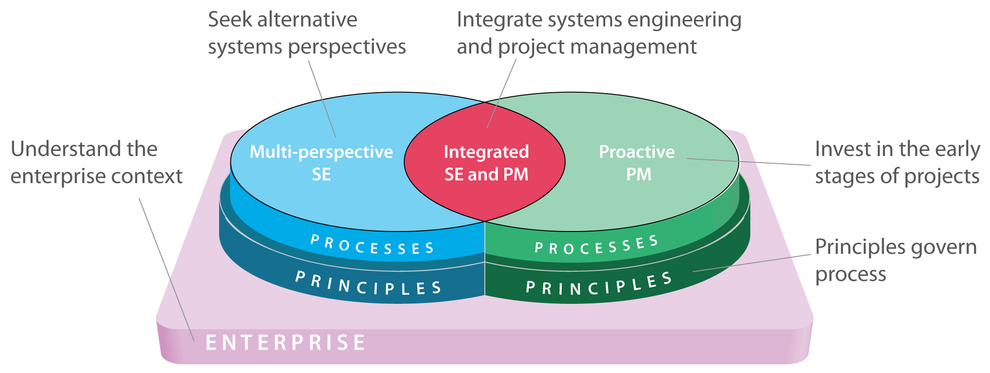
We teach what we know
For fifty years we have been developing complex systems for extremely demanding environments, including over two-hundred successful rocket and space science missions. Based on this experience, we have developed five guiding principles to Systems Engineering practice that we know to work in the field.
Principles Govern Process:
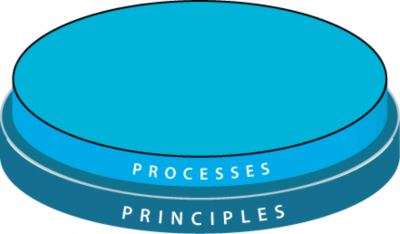
Processes should be seen as enabling rather than deterministic: certain individuals need to be both accountable for their actions and given a level of discretion in the application of high level processes.
When adapting a generic process to a particular situation the individual must first understand the principles that underpin the process. Principles should be derived from experience and analysis of past endeavours including development failures. It is essential to capture these lessons and continuously improve current processes.
Seek Alternative Systems Perspectives:
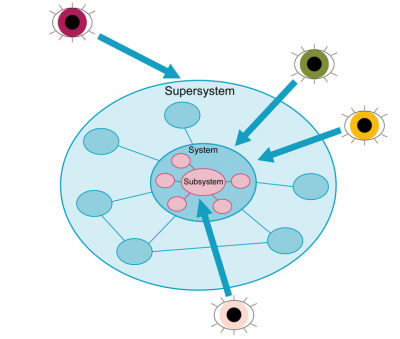
Complexity can be managed through a 'divide and conquer' approach, breaking systems into interacting systems elements and understanding the function of those elements, their interactions (both planned and unplanned) and how the elements collaborate to deliver the system's emergent properties. It is important to recognise the importance of overlapping hierarchies (elements that are parts of more than one system and require appropriate management and control). The time dimension can be a valuable source of insight. We should note the nature of the solutions to similar problems faced in the past, and recognise technology trends that will influence the next generation of solutions. In a changing world, system developments must accept the need for evolving requirements and include flexibility in delivered systems to adapt to changing needs during the system life.
Understand the Enterprise Context
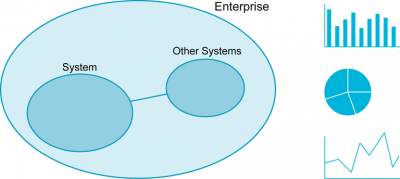
It is essential to understand the organisation's objectives and constraints when determining the optimal solution. Furthermore, the system development system (the combination of enterprise, collaborators and supply chain that develops the system solution) has to be configured to be fit for purpose within whatever constraints exist. Soft systems approaches may be applied to facilitate the accommodation of a systems development project within an organisation.
Integrate Systems Engineering and Project Management
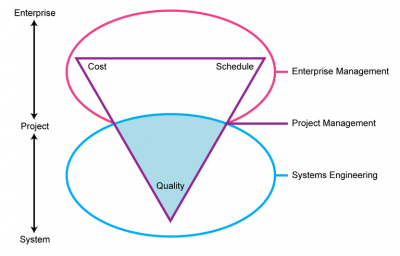
Different organisations define differently the responsibilities of project managers, programme managers, systems engineering managers, and chief scientists. Nevertheless there needs to be cooperation and coherence in the management structure which recognises the differing approaches of (systems) engineering and (project) management. While project management is typically based around a deterministic breakdown of the required activities and the creation and delivery of a causal network of such activities against defined timescales, engineering often involves iterative development with concurrent progress across a broad front. This difference can lead to real difficulties when reporting progress. Projects are systems, and need to be managed with a similar blend of science, heuristics (rules of thumb based on lessons learnt and best practice) and creativity. Too often projects are seen deterministically, when in fact there are major sources of uncertainty (threats and opportunities) which could have significant implications for optimisation. The optimum system depends on the project design, and the optimum project design depends on the nature of the system to be delivered. This interdependency between optimum system and optimum project needs to be recognised and managed.
Invest in the Early Stages of Projects
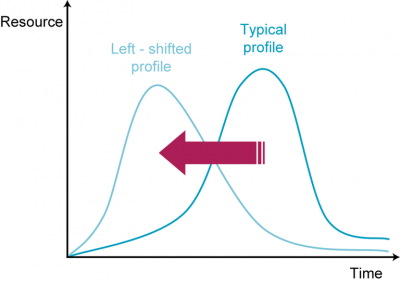
The optimum ordering of activities should be identified, resisting pressure to defer work until later for short-term reasons. Often this means that a project's ideal resource profile will be reshaped exhibiting an earlier peak (so-called 'left shift' of effort), with the expectation that this will lead to a reduction in the total effort required by the project, and a greater chance of project success. This approach can be extended upstream of the project, for instance investing resources in preparing for a future bid or even in predicting customer needs and future technology requirements. Above all, a project should be seen as an investment - it requires resources to be committed early on to deliver a (probabilistic) payoff later on (as major costs are avoided). Like other investments, projects should be seen as part of a portfolio of activities (a programme) that also needs to be optimised holistically.
 Close
Close

